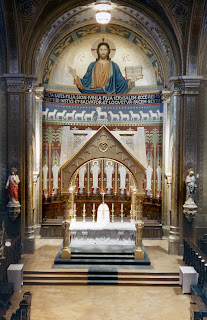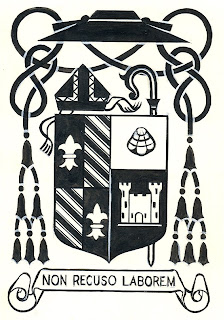
In many respects he was the epitome of abbatial authority. As a young monk he had spent six years at the Colegio di Sant' Anselmo, the Roman headquarters of the Benedictine order. He made friends with European monks of his own age and visited communities like Maria Laach and Beuron in Germany and Maredsous in Belgium where monastic observance had been renewed following centuries of religious and political turbulence. Those years shaped his notion of what Benedictine life should be like.
He doesn't appear to have entertained any doubts on that score from the moment he assumed office. On becoming abbot he instituted a daily horarium structured around the Hours of the Divine Office, the daily Eucharist, and the common table from which no one was excused except those unavoidable absent to carry out assigned tasks elsewhere. (Those assigned tasks elsewhere included the large number of ordained monks and some brothers who were stationed in parishes or missions distant from the abbey.) He had a short form of the Divine Office in English prepared for the brothers to replace the devotional prayers in a mix of German and English that had been the mainstay of their common prayer from the early days when few of them had much schooling.
"Vacation" was not a word in Abbot Alcuin's dictionary. Going off-campus for entertainment or dinner was unheard of. Radio was just becoming popular; Alcuin regarded listening to the radio as a pernicious habit. He frowned on cigarettes. Cigars were approved; he could appreciate an occasional Italian cigarillo. Once Prohibition was repealed the abbey purchased a load of grapes annually to make a raw red wine that was served at table on Tuesdays, Thursdays, and major liturgical feasts. There was a beer at table on the Fourth of July.
With a traditional sense of missa et mensa--Mass and meals--as the cardinal community activities, Abbot Alcuin had the church sanctuary re-done in Beuronese style with Brother Clement Frischauf's Christus Pantocrator in the apse.

The monastic refectory was paneled in oak with monochrome murals by Brother Clement depicting monks at work and prayer. The paneling and the heavy oak tables and chairs designed by Father Raphael Knapp and still in use came from the Saint John's woods by way of the abbey sawmill and woodworking shop.
Saint John's flourished under Alcuin's direction। One of his first actions was to restructure the academic apostolate chartered as a seminary in 1857 and styled a university by legislative amendment in 1883। On becoming abbot, Alcuin divided the university into a preparatory school, a college, and a a four-year major seminary, each with its own dean serving under him as president। Benet Hall, the first college residence separate from the Quad, was completed during his first yer in office. The auditorium (1928), power house (1945), and diocesan seminary (1950) were the other major construction projects of his tenure. The farm produced much of the food for monks and students: vegetable gardens, orchards, dairy herd, hog farm, chicken house, butcher shop, mill. The German Franciscan Sisters contracted by Abbot Peter continued to do all of the food preparation for monks and students--including 30-gallon jars of sauerkraut--throughout Alcuin's years as abbot.

Early in his abbacy he encouraged Father Virgil Michel's interest in the European revival of the liturgy , gave him the time to travel in Europe and get to know the leaders of the liturgical movement there, then return to Saint John's and in one climactic year, 1925-1926, found the Liturgical Press and the monthly liturgical periodical, Orate Fratres, gathering around him a cluster of other monks in the prime of their careers as preachers, writers, teachers.
In his twenty-nine years as abbot, Alcuin sent 102 monks away for advanced studies, among them Godfrey Diekmann, who was to be Virgil Michel's successor and a peritus on liturgical renewal at Vatican II। Alcuin wanted the college to be good but small. He thought monastic communities and schools could get too large. He resisted what he thought of as the intrusion of secular education standards and only reluctantly consented to seeking accreditation in the late 40s.

Alcuin was an extraordinary abbot because of the breadth of his vision, his intelligence, and his fearless dedication to what he saw as monastic principles. He was not unkind, but his word was law. In 1945 he stopped newly ordained Father Herman Wind in the corridor after breakfast and told him he was to go to the Bahamas to join the other monks there. This was Herman's first indication of what turned out to be his life mission. Abbot Alcuin didn't invite the young monk to come in and talk about it; he simply told him to go. Writing his memoirs forty-three years later, Herman said the abbot's decision to send him to the Bahamas came as a cruel disappointment; he had entered the monastery in the hope of serving in his home parish, Saint Bernard's in St. Paul. Looking back in retirement, he was grateful for the direction his life took because of Alcuin's confidence in his ability and his sense of obedience. More than any of the other past abbots of Saint John's, Abbot Alcuin Deutsch lives on as the local archetype of the wise and prudent master Benedict envisions in his rule for monasteries.
